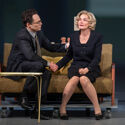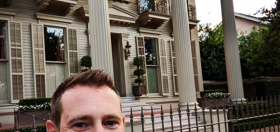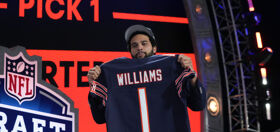 It was Valentine’s Day in Tiananmen Square, nearly twenty years after the student uprising that led to the death of an estimated 2,500 Chinese dissidents. On this day, 30 gays and lesbians are gathered nearby to lead a protest of their own. They’re dressed in bridal gowns and tuxedos and taking photos of each other. The police stand by, but don’t interfere. One of the men, Zhang Yi, tells a reporter, “I think that coming here and taking these wedding photos is for fun and a chance for everyone to come into contact with and understand us. But everything needs time.”
It was Valentine’s Day in Tiananmen Square, nearly twenty years after the student uprising that led to the death of an estimated 2,500 Chinese dissidents. On this day, 30 gays and lesbians are gathered nearby to lead a protest of their own. They’re dressed in bridal gowns and tuxedos and taking photos of each other. The police stand by, but don’t interfere. One of the men, Zhang Yi, tells a reporter, “I think that coming here and taking these wedding photos is for fun and a chance for everyone to come into contact with and understand us. But everything needs time.”
Welcome to gay life in China, the world’s most populous and rapidly changing nation. Where officially gays and lesbians remain on the sidelines, but in practice, are enjoying a new sense of freedom that’s borne on whispers, not shouts.
Like much of Chinese civic life, the real debate over the Valentine’s protests (if they can be called that—the political action consisted of handing out informative cards to curious passerby) occurred on Chinese discussion boards, where the news of the demonstration provoked a wide range of reactions. One man writes that the women ought to do their part and “Make some contributions to the tens of millions of single males [in China].” Another writes, “Love is love, and there is no specific reason. Who can say that there is no real love between them? How many males and females end up in divorce?”
China is a nation in the midst of a great transformation, embracing modernity, but doing it in a way that’s uniquely Chinese. This holds true for gays and lesbians as much as anyone. There are no formal political gay organizations in mainland China (there are a few in Hong Kong), but websites have taken on much of the organizing power and advisory status of Western gay rights organizations. Movies like Milk and Brokeback Mountain are banned by the state, yet Hong Kong’s Phoenix Satellite Television, which mainland Chinese have access to, ran a 12-part series called Tongxing Xianglian or “Connecting Homosexuals,” which featured openly gay hosts from different regions of China discussing gay topics on a panel. The show’s producer, Gang Gang, told the BBC:
How about we take this to the next level?
Our newsletter is like a refreshing cocktail (or mocktail) of LGBTQ+ entertainment and pop culture, served up with a side of eye-candy.
“We hope that after this show airs, homosexuality will no longer be an issue, that society will be more enlightened about it, more understanding and more tolerant.”
A lofty and unattainable goal, but in recent years, gay Chinese have seen tangible changes in the way the state views them. China has its own version of Don’t Ask-Don’t Tell that applies to gay rights in general known as “The Three Nos”: No approval, no disapproval and no promotion. But in practice, the country has eased restrictions on gays and lesbians that had been in place since the Cultural revolution.

In 1997, sodomy was decriminalized, and in 2001, The Chinese Classification and Diagnostic Criteria of Mental Disorders removed homosexuality as a mental illness. The government has sponsored HIV-prevention programs and clinics targeted at gay men, a response to the rapid spread of the disease, with infection rates jumping 5 percent in the last three years. The Chinese National Assembly has even taken up the question of gay marriage, with bills proposed in 2000, 2004 (which was accompanied with a petition signed by 10,000 people) and 2006, though each time the bill was dismissed.
In fact, the only people who still use the term “comrade” (‘Tongzhi’) in China are gays and lesbians, who use it as a slang way to identify themselves. The state-run English language newspaper, China Daily, has even taken to running, “Is he gay?” tabloid stories about teen pop star Wang Lee-Hom.
Beyond the Chinese government’s deliberate blind eye, attitudes are changing. Didier Zheng, one of the hosts of Tongxing Xianglian says, “After 2001, everything changed. Society is changing. We are paying more attention to gay man’s socialization and integration [into society].” A 2008 study by Chinese sexologist Li Yinhe found that 91 percent of respondents said they supported equal employment rights for gays and lesbians, while over 80 percent of respondents agreed that heterosexuals and homosexuals were “equal individuals.” Still, 40 percent found homosexuality “completely wrong.”
Watch Ted Koppel report on gay life in China:
The opposition to homosexuality stems from a different place than it does in the West. None of China’s major religions consider homosexuality a sin and reports of gay bashing are rare. Gang says, “Of course, discrimination remains … The kind of pressure on gay people in China is different to the pressure in Western countries. In the West, it is usually pressure brought by religion. In China, it is usually family and neighbors and peers.”
 But attitudes are changing. When 18-year-old Zheng Yuantao of Guangzhou told his mother, Wu Youjian, he was gay, she became a one woman PFLAG, setting up a blog to give advice to other children thinking about coming out to their parents. The site became a huge watering hole for the community, garnering over 100,000 hits. Readers call her “Auntie Wu”.
But attitudes are changing. When 18-year-old Zheng Yuantao of Guangzhou told his mother, Wu Youjian, he was gay, she became a one woman PFLAG, setting up a blog to give advice to other children thinking about coming out to their parents. The site became a huge watering hole for the community, garnering over 100,000 hits. Readers call her “Auntie Wu”.
Or take the story of Sun Dehua, a farmer from the northeastern city of Dalian, who planned on blowing up his son’s gay bar. He told The Guardian:
I believed he had been led astray by bad people or we would have a daughter-in-law and the happiness we deserved. I felt my whole life depended on him and I didn’t want to live any more. I was so angry I wanted to kill him and myself.
But when his son and his boyfriend fled, Dehua had a change of heart. He bought a house for the couple and hopes that they can someday be married, saying, “These people want marriage and it’s their right. We must learn to accept them.” Today, Dehua runs a hotline for parents of gay children. He says, ““I am really glad seeing them together, because Mu is so happy when he’s with him (his son’s boyfriend). Now it feels like I have two sons.”



















somethingawful
omg it’s like people in other countries can be progressive by their own standards and not need ‘help’ from the West.
JonDorian
Somethingawful, it looks like we can take a page from these other countries.
Jonathan
True, “from Shanghai to Beijing”… But while the more tolerant major cities like Shanghai, Beijing, Guangzhou in addition to Taiwan and Hong Kong make up a large part of China’s population, equally populous western China has a more spotty history, including anti-homosexual lynchings… the part of China we rarely see, taste, or imagine.
If y’all haven’t seen it, there’s a good amount of cool GLBT cinema from the mainland as well as Taiwan…. ”
East Palace, West Palace” and “Farewell my Concubine” are good places to start
flyerfier
China is indeed an amazing and confusing place. It seems like the US has been up their crack about so many human rights issues, but there certainly some lessons to learn from them as well.
Neither is perfect, but let me tell you that living in an Asian country is much easier for gay men. But, then again, that’s only if you have no family there!
Jay
hmm … I wouldn’t necessarily say easier, maybe just different. And for the whole thing about gay bashings, I wonder if it really is that it hardly happens, or if its that its hardly ever reported and documented.
The last little bit of the article makes me happy.
JonDorian
You know, I’m going to be the first guy to admit that China has a bad (see: VERY BAD) track record when it comes to issues of human rights but, to be honest, we Americans are fantastic at pointing out other people problems while downplaying our own issues.
I’m not comparing to the sufferings here to the atrocities there but, seriously people, when did we ever have the right to cast stones?
I remember when the whole issue of foot binding was a big deal, I was probably 11, 12, perhaps 13. The practice was on the outs and had been for a long time as I remember my great grandmother definitely could walk on her own. Even then, however I wondered why it was alright for women here to criticize women there when we’re putting implants in every which way.
Even today I’m a firm believer that breast augmentation is the new foot binding. It serves no purpose except to adhere to a specific ideal of beauty while serving no function whatsoever. Looking it in that light, it’s a very barbaric procedure and an extremely antiquated ideal.
Alright, rant aside, I applaud the Chinese for this silent protest. It’s my belief that eventually we will see a China that accepts gay marriage before we see an America that does the same for its entire country. After all, with ideals changing on the mainland, and without the constant persecution from religion, it’s only a matter of time before the politicians accept gays as just another kind of people. Maybe one or two more Chinese heads of state, who knows? But it seems to be happening before our eyes.
And to the naysayers that could never accept a China that’s more tolerant than America, let me put it this way. It’s a lot easier to change a constitution than it is to change the Bible or the Koran.
waxlion
Just a factual quibble here, but Wang Leehom is actually 30 or something and technically more of a big deal in Taiwan. (I forget if he was actually born there or in the US/Canada though)
I remember reading tabloid articles that even theorized that his dad was actually the gay one…
John from England(used to be just John but there are other John's)
Mmmm…
I’ve read and heard so much stuff…
And also its’ really popular for middleclass kids in the UK to go to China…and I have some stories….
Inn
Taiwan is not part of China.
jayta
erm..leehom is not gay..tabloids were spreading this rumor and leehom himself even denied this rumor. why would a news source print information from a tabloid? talk about bad journalism